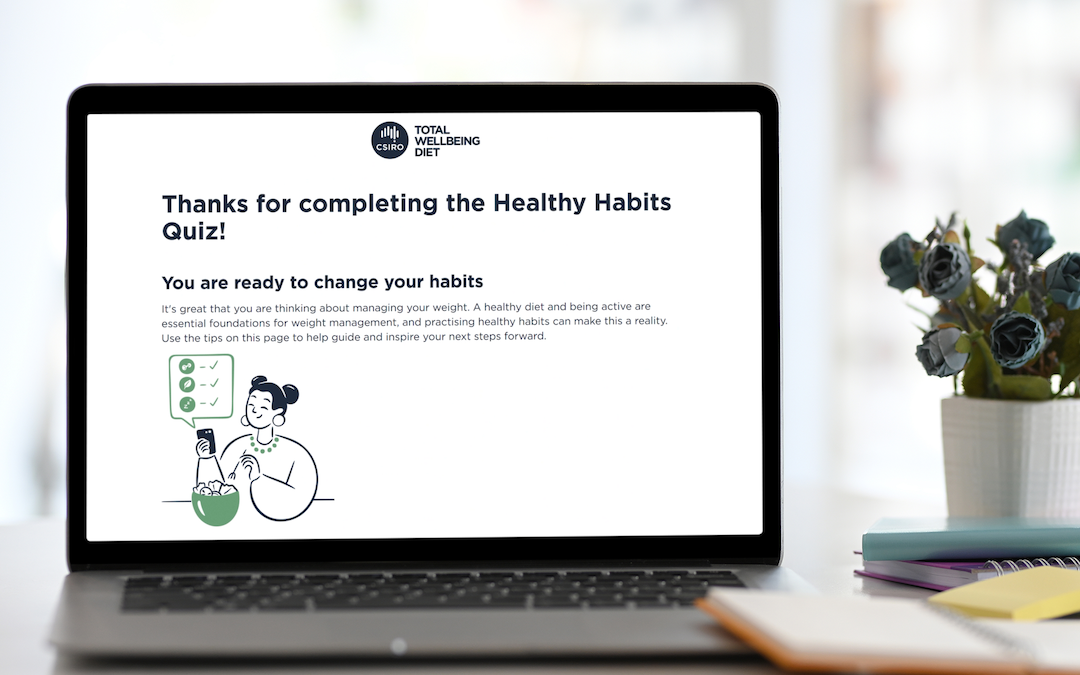The Healthy Habits Quiz is backed by psychology and behavioural science, addressing not just what people eat, but why they eat it, according to CSIRO Research Scientist Dr Naomi Kakoschke.
National science agency CSIRO launched a new tool this month called the Healthy Habits Quiz that aims to aid Australians with weight management and healthy eating.
The online tool, known as the Healthy Habits Quiz, seeks to evaluate user’s habits, as well as the link between moods and consumption of tempting foods such as processed meats, beer, and muffins. It then uses science-based guidance to help participants form good habits.
“We know that healthy habits support healthy weight loss, and unhealthy habits typically lead to weight gain,” said Dr. Kakoschke. “By becoming more aware of their habits through the Healthy Habits Quiz, Australians can kickstart a positive change to their habits and their health.”

A question on the Healthy Habits Quiz. Image: CSIRO.
The Healthy Habits Quiz comes after a recent analysis by CSIRO of about 2,000 Australians found that mood has a significant impact on eating patterns. More than 75 per cent of participants reported eating more when they were bored, and over 50 per cent reported eating more when they were depressed, according to the analysis. And, females are especially more prone to emotional eating, the study found.
At the top of the list for tempting foods was chocolate (at 72 per cent) followed by cheese and bread. Nearly all analysis participants said they were tempted by foods that are difficult for weight management if they consumed them in large quantities or very frequently, the release said.
The Healthy Habits Quiz – which is free and takes less than five minutes to complete – helps people identify behaviours such as these. Questions include checking off foods that get in the way of weight management, and having users identify reasons as to why they eat excess food, such as out of joy or out of boredom.

A lot of Aussies turn to processed meats, cheese, and bread when emotional eating. Image: Dan Dennis
Other Findings
The analysis also highlighted that positive emotions are a contributing factor to weight management; half of the participants reported eating less when they feel happy.
Some main contributors to healthy habits include talking to yourself in a positive manner, and reward and recognition, the analysis said. Other main strategies are tracking food intake, having a supportive social circle, and keeping track of your eating habits and progress.
“The data highlights that building healthy habits requires more than just good intentions; it requires support to make small, incremental changes that can be sustained over the longer-term,” said Dr. Kakoschke.
Other components of CSIRO’s weight management offerings include its Total Wellbeing Diet, which includes high-protein recipes, an online community, and digital weight loss tools. One participant in the CSIRO Total Wellbeing Diet program, Jayne Shortt, has lost over 20 kilograms since starting it. She’s now taken the quiz and said it was “an eye-opener” for her.
“It really put a spotlight on some of the things that trigger my eating habits,” she said. “For example, I tend to turn to food when I’m bored. Being aware of that now means I can actually differentiate between authentic hunger or if I’m just eating for the sake of it.”
The Healthy Habits Quiz can be taken here.
If you liked this story, check out our feature on eating clean for less with Box Divvy.

